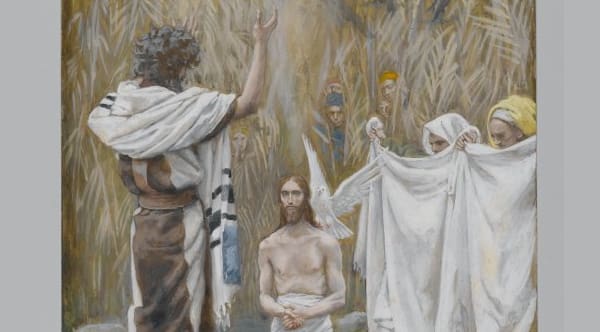On Sunday we celebrated Jesus’ baptism. In Catholicism, the liturgical season of “Christmas” does not even kick off until Christmas Eve, and then continues long after the world has moved on to marketing promotions for Super Bowl snacks, Valentine gifts, and TurboTax.
I remember Father Jack, throughout my adolescent and teen years, quizzing the congregation, and kindly scolding those who had kicked their Christmas trees to the curb too soon.
It may seem odd for the Christmas Season to include a remembrance of Jesus being baptized at age 30. It is a mystery well worth pondering, and one I have had ample opportunity to ponder.
This particular celebration has held a special place in my heart – in part because it coincides so closely with my own birthday. Whenever my anniversary of birth is a Sunday or a Monday, the Baptism of Jesus falls on the same day.
During my nine years of seminary, my birthday often fell in the midst of an annual retreat, prior to the beginning of spring semester. Many people celebrate their 21st birthday at a bar, but mine was in the middle of my first ever silent retreat. Good little Pharisee that I was, I kept perfect silence the entire time. The next two years, my friends Chad, David, and Peter couldn’t resist teasing me about my monastic virtue – not even breaking silence when they surprised me with a chorus of “Happy Birthday.”
On those retreats, God captivated my heart with this special moment in the human history of Jesus. The event of his Baptism is meant to be experienced by each of us as his disciples. All that is his becomes ours.
“You are my beloved Son. I am well pleased in you!” (Mark 1:11)
On those retreats, these words spoken to Jesus by his Father became words spoken by the Father to me. I desperately needed to hear them. I still need to hear them.
It is one thing to profess with my lips, “God loves me.” It is another to experience it. In terms of teaching, I seriously could not have missed this doctrinal truth that God loves me. During the “warm fuzzy” era of Catholic schools in the 1980s, it seemed to be the only content taught in our religion classes– and still it didn’t sink in! No doubt, it’s why Christmas and my birthday felt so special to me as a child. They were rare moments in which I felt like I really mattered.
To be human is to matter to God. He has sent his own beloved Son to reclaim us through the shedding of his own blood. By sheer gift, he not only reconciles us, but expresses his delight in us. The words spoken to Jesus are words meant for us.
During the baptism, the Holy Spirit also shows up with his anointing. That is what “Christ” or “Messiah” means – the anointed one. This is the moment in which the Father anoints Jesus in his humanity (cf. Acts 10:38).
To be “Christian” means to be anointed with Christ. Jesus is God’s eternal Son and has no need of repentance, no need of healing, no need of deliverance, and no need of power. John the Baptist intuitively understands and protests Jesus’ request to be baptized. But they proceed, “so that all righteousness can be fulfilled” (Matthew 3:15). God desires his righteousness to become ours – truly our own. He desires us to grow and keep growing into the holiness of Christ, which is nothing other than a communion of love in the life of the Trinity.
In one sense, the baptism of Jesus is a past event, over and done 2,000 years ago in that tiny and not-so-tidy river that still flows into the Dead Sea. In another sense, this event is ongoing. By God’s design, all human flesh is meant to be inserted into the flesh of Christ. All human flesh is invited to the regenerating waters of baptism. All human flesh is invited to be anointed by the Holy Spirit.
We need that renewal; we need that anointing. In the Scripture readings this Sunday, the prophet Isaiah proclaims the victory that the Messiah is destined to bring – calling prisoners out from the dungeon, opening the eyes of the blind, and helping the lame to walk – all possible because the Spirit of the Lord has anointed him (Isaiah 42:1-7).
Despite my dogged self-protection and self-reliance, God repeatedly pierced my defenses on those retreats, surprising me with the honor and delight of being claimed as his own beloved son. On those retreats, my heart burned with desire in reading the messianic prophecies of Isaiah. During those timeless moments of prayer, I was able to admit humbly how blind and lame and impoverished I was – not is self-shaming, but in a kind truthfulness. That humility made it possible to receive as free gift (like a birthday present!) the renewed cleansing of baptismal faith. I realized even then that God intended those words of Isaiah for me as well. As one sharing in the anointing of Jesus, I too am chosen and called to proclaim Good News in the darkest places of people’s hearts, to call out those held prisoner in the dungeon, to grasp them firmly by the hand, to invite them to be claimed as God’s beloved and to receive the same anointing. I knew then and know now that God has called me to be an instrument of his healing. It turns out that I wasn’t ready just then to leave behind my perfectionistic defenses. So God has gently reminded and re-reminded me that I have an ongoing need of healing and anointing myself if I am to be an instrument of healing for others. I can only give if I keep receiving.
The apostle Paul invites us to participate in the baptismal rebirth and renewal that is freely and gratuitously offered in Jesus, along with the rich outpouring of the Spirit (Titus 3:4-7). Let us come into the waters of baptism with Jesus. Let us cast off the deeds of darkness and commit ourselves to live soberly, justly, and devoutly in this present age as we joyfully await in hope his glorious coming. Let us place our trust fully in his victory, freely given to us. With him and in him, let us become God’s anointed!
Image credit: The Baptism of Jesus by James Tissot, Public domain, via Wikimedia Commons.
This post was originally published on Abiding in Truth and Love and is reprinted here with permission.




